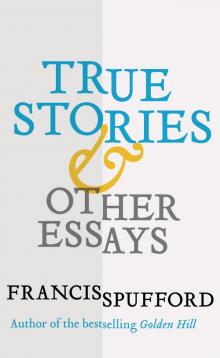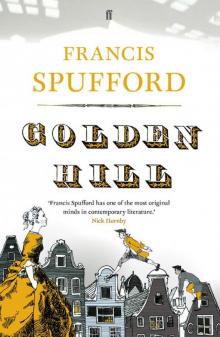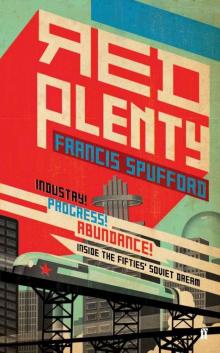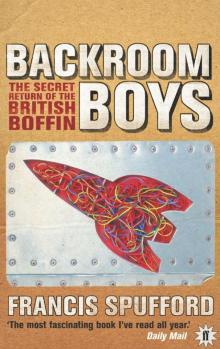- Home
- Francis Spufford
Light Perpetual Page 7
Light Perpetual Read online
Page 7
‘Now,’ says Dr Armstrong brightly, as Ben shuffles across the lino, ‘this is Mr Holcombe. Mr Holcombe is a voluntary patient. Age twenty-two, employment since leaving school as a kitchen porter and then bus conductor. He presented six – no, seven – months ago at his GP’s in a state of extreme agitation, asking, quote, “to be put to sleep”. Questioning elicited no apparent prior history of depression, but complaints of persecution by intrusive thoughts, possibly amounting to auditory hallucination. Diagnosis?’ she asks the room.
He is being used as a teaching aid.
‘Schizophrenia,’ says a confident boy with sideburns.
‘Correct,’ says Dr Armstrong. ‘But with the usual reservations – yes? – about the breadth of the schizophrenic syndrome and its failure to offer fine classification of specific conditions.’
They all write in their notebooks.
‘Admitted eighth of June 1964. Initial dose of 400mg chlorpromazine. Trade name?’
‘Largactil,’ says a girl with a brown plait.
‘Or Thorazine, yes. Increased to 500mg when agitation persisted, then successful maintenance at 300mg per day thereafter. Behaviour?’
This last question is directed to Nurse Fredericks.
‘Ben is no trouble at all,’ he says. ‘As good as gold.’
‘I’m glad to hear it,’ says the doctor. ‘And how do you find yourself, Mr Holcombe.’
‘F-f-f-fine,’ Ben manages to say.
‘Excellent,’ says Dr A. ‘But gentlemen, ladies, what do you observe? You’ve seen Mr Holcombe walk, you’ve heard him speak, you can see how he’s sitting. Thoughts?’
They all stare at him. The girl with the plait taps her biro against her teeth. A small, slight Indian student, neat and brown and feathery-eyebrowed, like a sparrow you could pop into your pocket, clears his throat and says: ‘Tic in his right hand. Quite pronounced.’
‘Indeed,’ says Armstrong, and as if her approval had granted everyone permission, they all start to offer suggestions.
‘Gait ataxia?’
‘Parkinsonism?’
‘He keeps sticking his tongue out?’
‘Frequent blinking?’
‘T-t-t-’
That last one is Ben, trying to say tardive dyskinesia, which is what he saw written on his notes when they were left facing him at the nurses’ station. He doesn’t know what it means and he knows he’s not supposed to join in, but the urge to surprise them all is too strong. In fact, though, since he can’t get the word out, all they hear is another symptom.
‘Speech difficulties!’ says Plait Girl triumphantly.
‘Mm-hm,’ agrees Dr Armstrong. ‘All symptoms which, if we didn’t already know Mr Holcombe’s medical history, might lead us to suspect – what?’
‘Cerebral palsy,’ suggests the Indian student.
‘Yes, or Huntington’s chorea. We’d be testing for both of those if Mr Holcombe presented himself like this for an initial consultation. And yet – and this is what I want you all really to notice – there is nothing organically wrong with Mr Holcombe at all. Every single one of these symptoms is a secondary effect of neuroleptic medication. Mr Holcombe is a healthy young man. It is chlorpromazine that has done this to him. Yes, Mr Patel?’
The Indian student has raised his hand.
‘He has been unlucky, I think. These symptoms would usually take longer to come on, and affect older patients more?’
‘Indeed. Only about thirty per cent of patients have these reactions, and Mr Holcombe is one of the unfortunates within that percentage who exhibit them particularly strongly.’ She holds up a finger. ‘Remember, please, that this is ordinary. Rare outcomes are not outcomes that never happen. They are outcomes that happen all the time to a few people. And as clinicians, we must expect to encounter these people, and to be prepared to care for them.’
Scribble, scribble, in all the notebooks.
‘So, how shall we care for Mr Holcombe? The tics, the impeded movement, the interrupted speech: I said there was nothing wrong with him (apart, of course, from the schizophrenia itself) but it would have been more accurate to say that there was nothing wrong with him yet. Because …?’
‘Because the symptoms can become permanent.’
‘Thank you, Mr Patel. So what should we do for Mr Holcombe? Recommendations?’
‘We could switch him to a different medication?’
‘Such as, Miss Edwards?’
Plait Girl looks down; she doesn’t know.
‘Well,’ says Dr Armstrong, ‘we could try him on Fluphenazine or Acepromazine, true, but they are from the same family of drugs, and they all produce the same side effects, and we know that Mr Holcombe has an elevated susceptibility. Anyone else?’
Patel coughs questioningly, but no one else wants to speak.
‘We must taper off his dose, quickly?’ he says.
‘N—!’ says Ben. ‘N—!’
The noise he has made is more a groan than a word. The doctor frowns at him, but gives him a pat on the arm and goes on talking.
‘I think so, yes,’ she says. ‘Not too quick a decrease, but a prompt one, in the first place to a much lower maintenance dose, with perhaps some conventional sedatives if the psychotic crisis shows any signs of returning. But you’ve had a nice quiet few months, haven’t you, Mr Holcombe?’ she says kindly, raising her voice as if speaking to a deaf person. ‘Time to get you home again. You don’t belong here.’
It is possible to be afraid on Largactil, Ben finds. Angry, too. If the emotion is strong enough, it sweeps through the room with the muffled furniture, bumping it and rattling it like a wind, throwing it to and fro while your heart bangs. He throws off Dr Armstrong’s hand – she wouldn’t smile at him if she knew what The Trouble murmured to him – and pushes to his feet.
‘No!’ he bellows thickly, his tongue getting in the way like something half-swallowed. ‘Naow!’
The students avert their eyes. Armstrong sighs. This is not how she wanted her little demonstration to end.
‘Fredericks?’ she says. The nurse moves forward, irresistible, and takes Ben by the back of the neck with one wide hand.
‘No need for that, son,’ he says. ‘Calm down, now, calm down.’
‘Maybe give him his next dose now, and start the taper tomorrow,’ she commands. Fredericks nods, and has him out of the door in seconds.
‘Honestly!’ says the nurse. ‘This ain’t like you at all.’
Ben is used to getting his Largactil as foul-tasting syrup in a little beaker. But now it arrives as an injection in his arm, and from the place in his vein where the needle goes in, calm does spread with astonishing immediacy, a blanking numbness that freezes all the rattling contents of his head in place as if they’d never move again, and wipes away too – for now, at least – all the terrors of the future, all that will need to be endured again in solitude.
‘You have a sit in your chair,’ says Nurse Fredericks, ‘and I’ll get you a nice cup of tea.’
Look: each tree stands in a ragged oval of leaf-fall, summer’s discarded yellow petticoat.
Jo
In the wings at the Pelican Club. Well; the wings. The ‘artists’ entrance’ to the Pelican, so-called, is up a Soho alley that smells of men’s piss and indeterminate rotting things, in between an Italian grocer’s selling spaghetti in long blue paper packets and one of those doorways with many bells where shamefaced men come and go without meeting anyone’s eye. You go up the alley, and a door lets you downstairs into a warren of little backstage spaces, many with black bundles of cable snaking about on the floors. Jo changed into her Tearaways outfit in a narrow slot halfway between a dressing room and a corridor, with mirrors in horseshoes of light bulbs on one side but people coming and going behind, and not much privacy. And the wings are another compromise, an L-shaped left-over tucked next to the stage, where people do wait to go on, but where there are also dead amplifiers stacked, and cardboard boxes of flyers for gigs past and gigs yet to come. Par
t of the roof of the L is made of the green glass bricks that run right across above the stage itself, letting in a watery aquarium light from the pavement outside the front of the Pelican, when it’s daytime. Go on early at the Pelican, in the summer, and the glare coming at you from the spots competes with a rainy glitter draped over your hair and shoulders like jewellery.
It’s fully dark now, though, and from where Jo is tucked in the angle of the L she sees the stage as it looks when you’re performing on it at night. The light strikes down and in from the track running around the little proscenium, and it kindles the air where you are into a radiant wall. Apart from the dancing legs of the front row, in drainpipes and tight skirts, and the occasional dangling hand holding a smouldering fag, you can’t see the audience, packed in five feet in front of you: you can only hear them, a hooting whooping sighing swaying presence just outside your tent of light.
In the tent of light is Willy Reeves of Chicago, stamping on a wooden block to make his own percussion and pounding through a twelve-bar on a steel-string guitar, in a way that somehow contrives to sound both heavy and light at the same time. Heavy, as in inevitable; as in blues-logic proving its way through the changes and coming home as certainly as the tumblers of a safe locking into place. Light, as in playful; as in fingers that dance their way in and out of inevitability as if they had all the time in the world, and arrival at the iron-hard conclusion might be an airy impulse. I cain’t hardly, sings Mr Reeves. Tell my baby. Backstage, he is a small walnut-coloured lech, reeking of whisky and making a stumbling nuisance of himself. Out here, where the democracy of the tight space abruptly shakes itself out into aristocrats and commoners, headliners and mere backing musicians – he’s an aristocrat, for sure. The part of the invisible audience who know what they’re getting are reverently mute, in a hush of attention, although the hush is edged by some impatient mutter from the rest. This year, proper Chicago blues isn’t quite the commodity it was in London. You can get it from pretty-boy white guitar bands now, or a version of it, rather than from old black men. You can get it hipper, better-dressed, more fanciable, more danceably diluted into a solution of rock ’n roll. A lot of the crowd want to get on to that part of the programme.
Jo, though, is with the mute and reverent contingent. She’s listening with her ear cocked, hungry for the secrets of how Reeves does what he does. She done tol’ me. Ev’ry mornin’. She should probably be back in the haze of hairspray, perfecting raccoon eyes with the other Tearaways. She’s the new girl, after all, brought in to fill a space left by pregnancy, and she should be chatting with Viv and Lizzie, cementing things. But this is too good a chance to miss. Reeves’s chords sound out in her mind, gunmetal grey and blackish-brown like Bournville chocolate, for she still hears in colours, though she knows now that people mostly don’t. Her fingers move in the air at waist height.
Someone jostles her. Concentration broken, she glances behind and finds that, guess what, the pretty-boy white guitar band who’re due to go on next but one have pushed round the corner of the L too, to get their look at Willy Reeves. They’re a slightly motley lot, with a look (suede jackets, jazzman polo-necks, denim jeans with big buckles) that says, to her at least, that they don’t know what to aim for, now that the Beatles have claimed smooth ’n cheeky and the Rolling Stones have taken over rude ’n rough. They’re called the Bluebirds, if she remembers rightly. A little pathetic in itself: a name so busy creeping up on the Yardbirds that it hasn’t noticed it’s gone accidentally all Walt Disney, twitter-twit round and round Snow White’s head. Mind you, thinks Jo, the Beatles have got one of the worst band names of all time, and nobody even notices any more. She hardly even notices herself.
Took ma chances. Played ma cards out. Needless to say, none of the irritated scrutiny she’s giving the Bluebirds is coming back her way. She looks good tonight, she knows she does: the Tearaways have an Honor-Blackman-in-The-Avengers thing going, and are all wearing tight black sweaters, tight black trousers and boots with spike heels. Three in a row at the mike, swaying in time, they look kinkily fabulous. But right now, she’s girl-furniture as far as these whispering, oblivious boys are concerned. They’re locked in the serious business of male-to-male musical adoration. Without even noticing it, the one with the sideburns has backed her against the amp stack. The one with the thin froggy lips has blocked her view of Reeves. The skinny one with the nose has trodden on her foot, then tried to kick it away under the impression it’s cabling. She’s been absent-mindedly pushed behind a wall of bloke.
‘Amazing,’ breathes Sideburns. ‘Fuckin’ phenomenal.’
‘Hear the way he sort of slaps it, on the six chord?’
‘Just like on the LP.’
‘We’ve got to learn that.’
‘Yeah, you’ve got to learn that.’
‘Well, I will,’ says Sideburns. ‘I will. ’S just, he picks it so fast, yeah? Look at that. I can’t even— I just can’t.’
‘No such word as “can’t”.’
‘No such word as …?’
‘Ladies present,’ says Froglips, gaze unwaveringly fixed on Reeves.
‘You swine.’
‘You filthy swine,’ they chorus, in a strangulated, murmured version of Bluebottle’s voice from The Goon Show.
Oh, shut up, thinks Jo.
Clearly there has been worshipful listening to Reeves’s long-players in whatever bachelor pit these idiots inhabit. Blue-and-white Chess Records label going round and round on the turntable, stylus dipped crackling into the groove for three or four bars then lifted out again; fingers on the fretboard trying to puzzle out something sounding the same, nearly the same, not quite the same, memory of the original slipping, lost it. And repeat. Banging on the party wall from infuriated neighbours.
‘Hey, he’s doing “Northbound” …’
‘Yeah …’
‘I love this song.’
‘Yeah, but you can’t play it.’
‘I can. I so nearly can. Except—’
‘Here it comes—’
‘—yeah—’
‘That. What was that? On the five chord? That sad … thing. I’m looking at his actual hands, and I still can’t work it out. ’S nearly a B seventh; ’s not a B seventh. What is it?’
She shouldn’t, she knows. In her experience nothing good at all comes from making the faintest criticism of men’s expertise in what men think of as men’s stuff. Probably if she had spent the usual amount of time in men’s company the urge would have been completely squeezed out of her by now, but the years of nursing Mum in relays with Auntie Kay, while Val went out gallivanting with bloody Neville and his predecessors, made for a lot of evenings on her own. Home from the job in the shoe shop; take over; make the tea and coax it into her; sit by her; measure the medicine, and the medicine, and the medicine. Then alone, either at the upright in the front room, playing from the weird mixture of Dad’s pre-war sheet music, or upstairs, slipping the treasures from the record library on Harper Street free of their sleeves, and lowering her own stylus into the valleys of the black vinyl, and making her own experiments in reproducing the sound. ‘You’re like an old maid,’ says Val. (Thanks, Val.) And it’s true that by Val’s standards she’s about six years late at venturing into the men’s world. (And whose fault is that, Val? Who took all the fun and left me with all the duty?) But time alone does tend to get you trusting your own judgement, there being no one else’s around to trust. Is this an advantage? Probably not. All the magazines say not, all the wives she’s ever talked to say not, bloody Val when she’s offering expansive advice says not. You don’t ever let men know that you know better. Even if you do. Especially if you do.
But her foot hurts. And Mum is dead. And she’s been waiting too long already.
‘It’s an open A and a finger sliding up the D-string to a seventh,’ she says.
An almost undetectable pause, and then they resume as if she hadn’t spoken.
‘Just mystifying,’ says Sideburns. ‘It’s
a mystery of the blues, that’s what it is.’
‘A blues Bermuda Triangle.’
‘The lost city of the blues.’
‘A blues enig-ma,’ says Frogface, doing an old-fashioned newsreel announcer’s voice.
‘You could always ask him, when he comes off,’ says Skinny.
‘Nah.’
They pause again. North-bound, North Side. Reds ’n whites.
‘Don’t know what that means either,’ says Frogface.
‘Maybe,’ says Sideburns, ‘maybe …’ He has the air of one labouring to bring forth a discovery.
‘What?’
‘Maybe it’s not a B-chord at all. Maybe it’s, like … a combination of some kind?’
Jo rolls her eyes in the dark. But to her surprise, Frogface starts to snicker.
‘Genius, mate! Just came to you, did it?’
And he shuffles sideways enough to be able to turn and look at Jo.
‘How d’you know that, then?’ he says. Unlike the others, whose voices are pure grammar-school London, from one of those middle-class zones in Hendon or Ealing or Sydenham where the middle-class-ness overpowers the difference between the city’s compass directions, his voice has something warm in it that comes from elsewhere: from west, and further west than Ealing by a long way. A burr. Bristol, maybe. He’s a head taller than her. His face is insolent-clever but he’s not sneering now; he’s leaning in, interested.
‘Worked it out,’ she says, shrugging.
‘You play?’
‘A bit.’
‘You like this?’
Shrug.
‘Why? Wouldn’t have thought it was a chick’s kind of thing.’
He means, of course, that the blues is men’s music. Songs of male misery and male disappointment and male boozing, sung by men with aggressive unprettiness, all sinew and bone, so that the sound itself seems to mimic strength being defeated, independent of the words. That’s not the whole story, of course, just the story that boys tend to see. But it’s true that, compared to the bone-hard jangle Willy Reeves is laying down now, the music she’s going to make when she goes on stage with Viv and Lizzie, any minute now, will sound deliberately light and sweet and girly, apparently woven out of candyfloss, with all its muscles concealed. So yes, why? If she likes the one, why is she making the other? The question has answers she certainly won’t give here; maybe answers she couldn’t give anywhere. Part of it is, she doesn’t see why she should choose. Willy Reeves singing ‘Northbound’ is glorious, and the Crystals singing ‘Da Doo Ron Ron’ is differently glorious, and to tell the truth neither of them are exactly her cup of tea, neither of them sound like the music she would make on her own account. Will make, some day. And underneath there’s another reason, made of silence. It’s a reason to do with their house being quieter than any other house in the street, always. Only two kids; no man; and later a sickroom hush getting deeper and deeper. She wanted to fill it, and she did, listening hard to everything she could get, picking determinedly along. Working it out, and working it out, knowing that she would still be missing most of the music until she could make it with people. Till Mum died, and she saw the advert for the Tearaways audition, and she dared.

 Light Perpetual
Light Perpetual True Stories
True Stories The Child that Books Built
The Child that Books Built Golden Hill
Golden Hill Unapologetic
Unapologetic Red Plenty
Red Plenty Backroom Boys
Backroom Boys